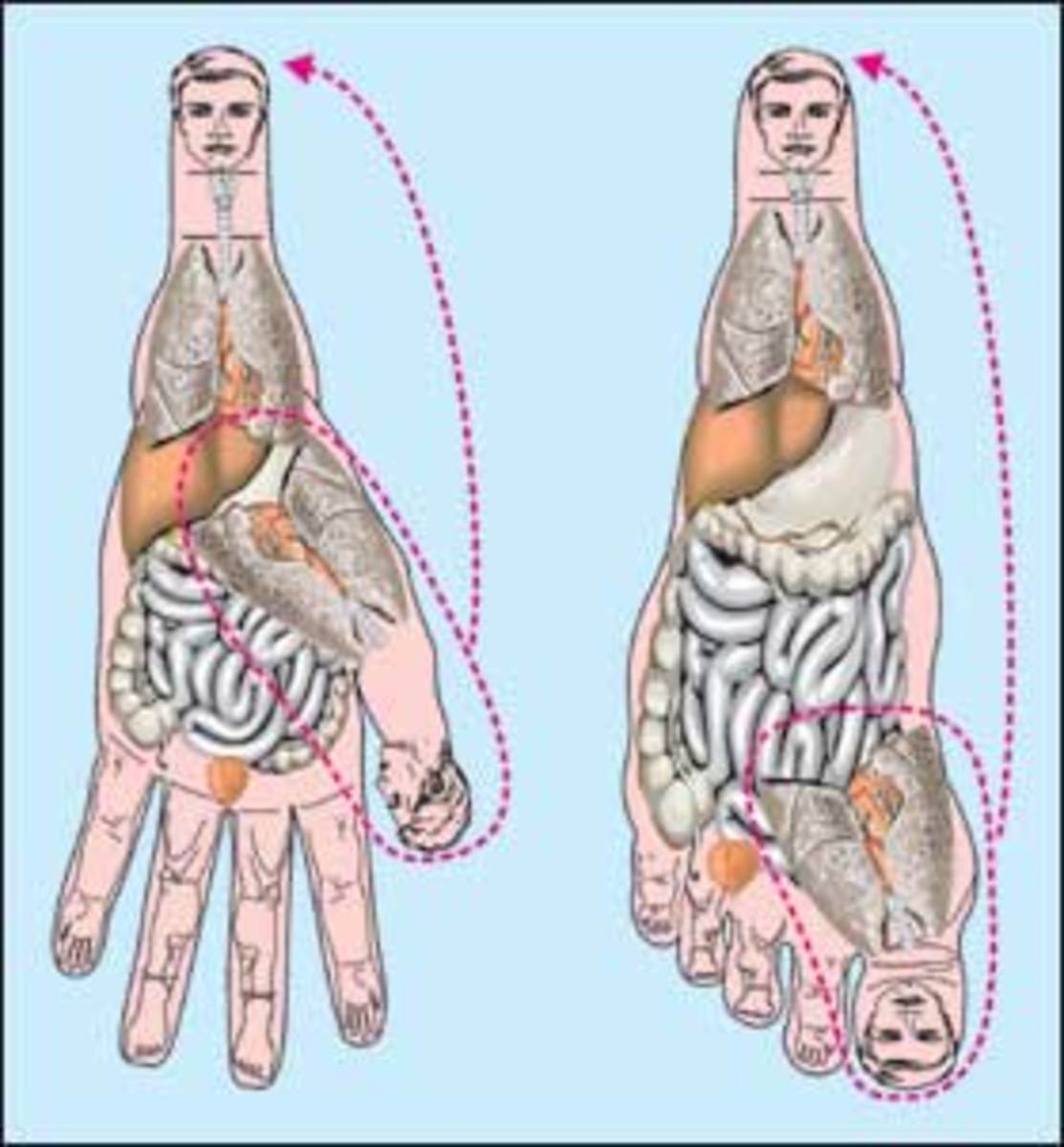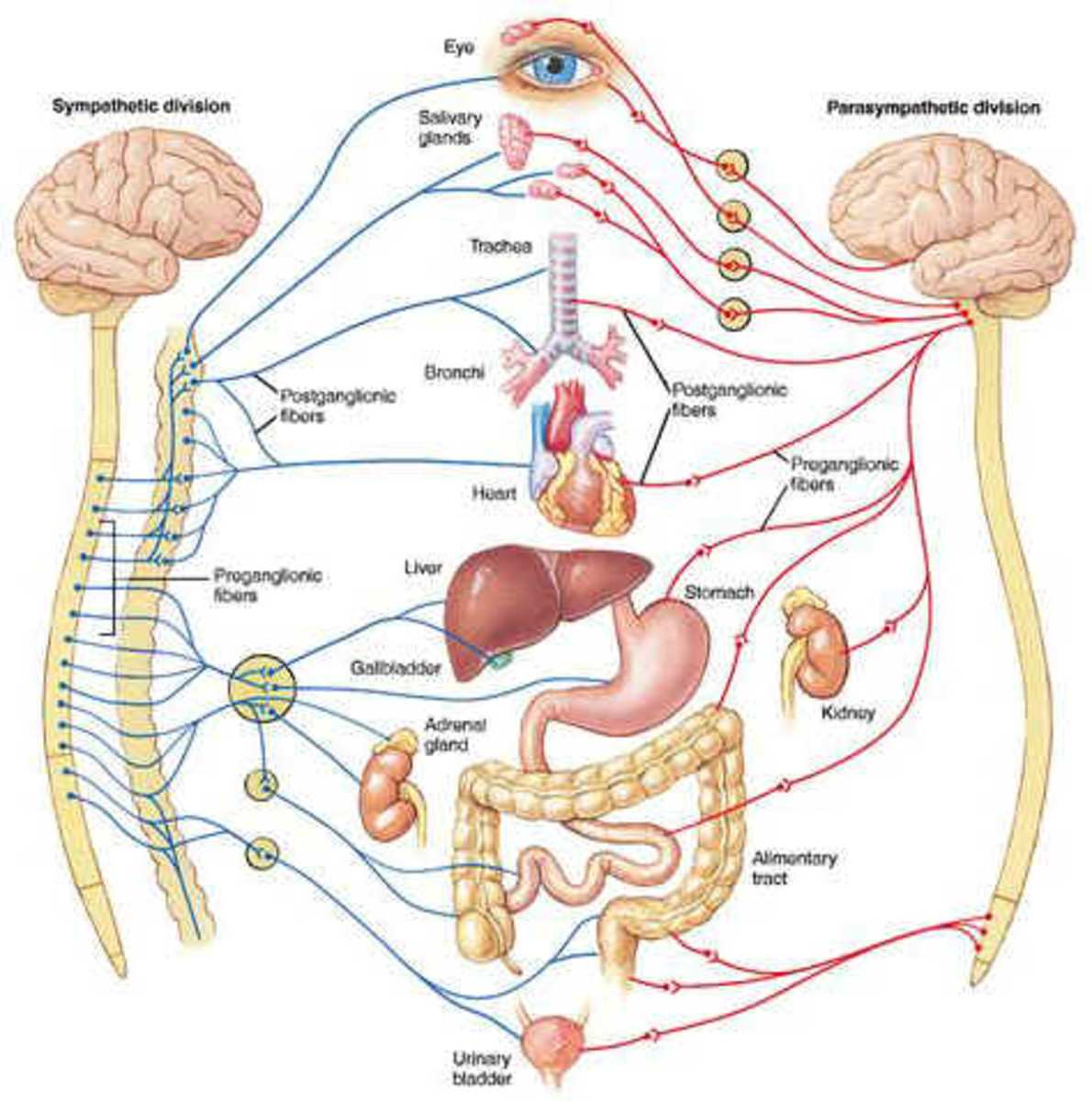- HubPages»
- Health»
- Mental Health»
- Emotions
The Physiology of Emotion
Emotions Affect All Systems of the Body
Circumstances are processed through the past experience files of the brain. Repeated experiences trigger automatic responses in the body. Those that are considered to be positive release pleasurable impulses that trigger relaxation and enjoyment. Negative experiences trigger fight or flight responses. Immediately, the systems of the body are on alert and remain so until the situation is resolved or passes peacefully.
The body is very sensitive. Awareness of how our body functions and the symptoms we experience will help us to see how negative emotions are affecting us. The following diagrams explain how each system of the body is affected by negative emotions:
The Nervous System
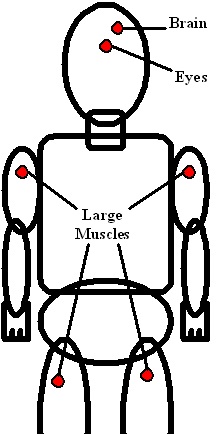
The Nervous System
Brain activity increases, sending messages out to the entire body to be on alert.
Symptoms – headache, swelling feeling, lightheadedness, and dizziness.
Eye sensitivity.
Symptoms – blurred vision, sensitivity to light, distorted depth perception and clarity.
Increased nerve impulses to large muscles.
Symptoms – increased energy, twitching of muscles, nervous drumming of hands or feet, desire to move quickly, inability to relax, muscle pain and spasms.
We increase the health of our nervous system as we learn to identify our emotions and deal with them as they occur. When we feel angry, admitting our anger and finding positive ways to express it keep us from internalizing these feelings. We find ourselves having greater control over our voice inflection and temperament.
Recognizing unrealistic fears allows us to use positive self-talk to help bring them back into perspective, thereby alleviating anxiety that leads to excessive worry and its accompanying issues. The time we take to deal with our emotions will be time spent out of the doctor's office.
The Gland System
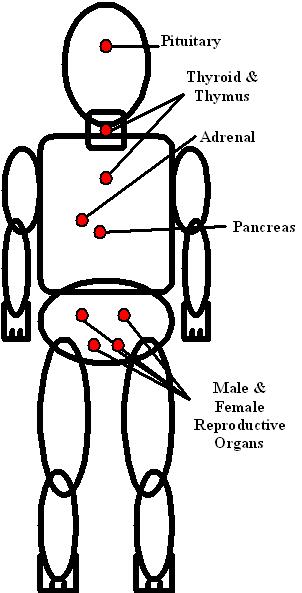
The Gland System
Thyroid and thymus glands secrete more hormones.
Symptoms – increased metabolism, increased hunger, digestive fluids, and faster heart rate.
Increased hormone secretion from the adrenal gland.
Symptoms – all body systems are in a state of alert.
Pancreas produces more insulin.
Symptoms – increased thirst, waste production, and elimination.
Male and female sex hormone production increase.
Symptoms – greater desire for sexual activity, more aggressive behavior, little sensitivity to partner or other dependents’ needs, greater drive to provide/protect/nurture, perhaps even to control other’s actions.
Our gland system is the hormonal system of the body. The hormones govern the digestion of food, our moods, and our ability to respond in emergency situations. Problems with the gland system lead to problems with all major systems of the body.
Recognizing and working through our emotions as they occur gives us an edge when we are dealing with the unexpected. Our senses are sharp, and we are able to make quality decisions having to do with vital resources that make a difference in our own lives and that of our loved ones.
The Digestive System
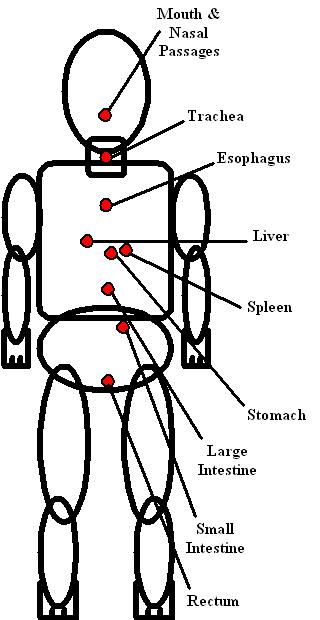
The Digestive System
Mucous production in mouth and nasal passages.
Symptoms – runny nose, watery eyes, swollen passages, coughing, spitting, and difficulty hearing.
Swollen trachea opening and constriction of esophagus.
Symptoms – shortness of breath, coughing, choking, and even vomiting.
Increased activity in liver and spleen.
Symptoms – increased urination and movement of waste into the elimination channels, increased nutrients into the bloodstream and muscle tissue, rise in blood pressure, sweat glands produce.
Stomach acid production increase.
Symptoms – acid stomach, ulcers, acid reflux, heartburn, and indigestion.
Increase in material moved into the large and small intestine.
Symptoms – pain, gas, swelling in abdomen, constipation, diarrhea, hemorrhoids, polyp formation, blood in stools.
The digestive system is especially vulnerable to problems with fear, anxiety, and worry. We end up with such issues as ulcers, colitis, and other stress induced illnesses. Our ability to calm ourselves when we feel fear often depends upon our level of spirituality and connections with God. When we feel assured that we are being watched over, that our needs are known, and have confidence that all will work out for the best, our anxiety and fear can be assuaged.
The Musculo-Skeletal System
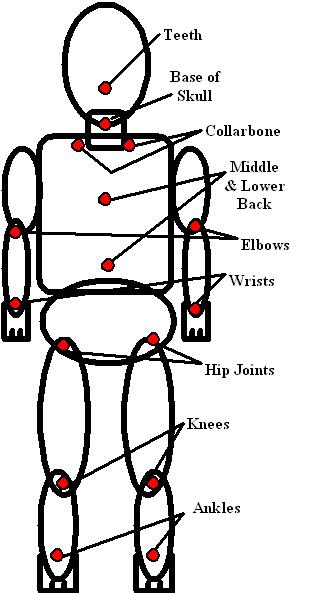
The Musculo-Skeletal System
Clenching of teeth.
Symptoms – pain in the jaw area, headaches, face muscle tension, chipped particles of teeth, and wearing down of the enamel.
Tightness at base of the skull.
Symptoms – headache, neck pain, cramping in the shoulders and neck, arm numbness and tingling.
Collar bone restriction.
Symptoms – tightness in chest and neck, shallow breathing, sunken chest, and chest pain.
Middle and lower back tension.
Symptoms – back pain, chest pain, heartburn, difficulty breathing, and inability to sit up straight in a chair.
Shoulder, elbow, and wrist tightness.
Symptoms – numbness/pain in lower arm, pain in fingers and joints, stiffness, clumsiness, and swelling.
Tension in hip and knee joints.
Symptoms – pain and stiffness, leg cramps, difficulty bending, pain or numbness in the ankles, feet, and toes.
Our musculo-skeletal system often receives the brunt of our negative emotions. We end up with back problems, pain in the joints, and spastic muscles. Learning how to relax is a vital skill to develop, and gives our body systems the opportunity to rejuvenate themselves.
Wholesome recreation is an important part of our emotional health. It allows us to work off some of the built up or pent up emotions we experience. This type of physical activity refreshes our minds, bodies, and spirits, and gives us enjoyable ways to interact with friends and family.
The body is like a barometer. When the pressure of negative emotions rises, the bodies functions change to accommodate it. As thoughts are changed, negative emotions give way to positive ones and the pressure falls.
The Cardiovascular System
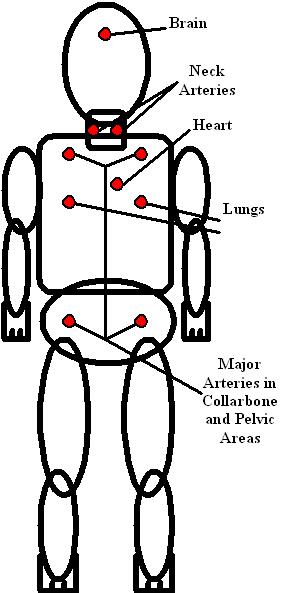
The Cardiovascular System
Increased blood supply to the brain.
Symptoms – headache, dizziness, lightheadedness.
Swelling of major arteries in the neck area.
Symptoms – tension and pain in the base of the skull, neck, and shoulders, redness in the face and neck.
Heart swells with an increase of blood flow.
Symptoms – racing heart, sweating, and pain in the chest.
Increased oxygen supply to the lungs.
Symptoms – shallow, rapid breathing, pressure and pain in the lung area, light-headedness, dizziness, and possible fainting.
Swelling of major arteries.
Symptoms – numbness and tingling in the extremities and soreness at pressure points.
The cardiovascular system is probably the most susceptible to negative emotions, as is seen by the high incidence of stress-related heart issues, blood pressure problems, and artery buildup. What we eat is not the only thing that affects this delicate system. What we think and how we respond to emotional stimuli are also a big part of the problem.
Our physical health is integrally connected to our emotional health. One affects the other. When our physical health is poor, it will be reflected on our emotional health. We will find that we have difficulty with more negative emotions, and we cannot recognize or manage them. When our emotional health is poor, we make unwise decisions on how we take care of ourselves, thus undermining our physical health.
This content is accurate and true to the best of the author’s knowledge and does not substitute for diagnosis, prognosis, treatment, prescription, and/or dietary advice from a licensed health professional. Drugs, supplements, and natural remedies may have dangerous side effects. If pregnant or nursing, consult with a qualified provider on an individual basis. Seek immediate help if you are experiencing a medical emergency.
© 2012 Denise W Anderson

